-
List Therapy
Though we’ve never met in person, I consider Amelia a close internet friend, a longtime reader, and a woman of enormous wisdom and warmth that she can’t keep from effusing through her digital self. If I could convince her to write a weekly column for us, I would! But meanwhile, her presence on Instagram is a generous window into her humble, gracious approach to life and motherhood. In her essay shared with us here, I love the way the idealism of to-do meets elevation of memory.
It all begins with the right atmosphere. There should be a decent amount of time to think and write. A favorite pen is lovely, good posture allows for penmanship you can be proud of, and no children on your lap/on top of the table/trying to chew on your pen is ideal.
This doesn’t happen to me very often.
At this point in my life, I make lists in my head, in the quiet busyness of making beds and putting dishes away and in the pick-up line at school. I forget them all by bedtime. Still, somehow, even just thinking the lists, one by one, helps me. Like taking the messy pile of thoughts in my brain and clacking them on a desk till they form a tidy stack. I feel better, even if they eventually flutter out of my brain like leaves down the street.
When I do have time to write them down, I like to keep my lists in notebooks. By now I have enough of them to line a shelf in my living room. Though I’ve never been good at keeping a diary or organizing photo albums, I can crank out enough lists to fill a notebook in a matter of months, and flipping through those old notebooks provides the same kind of nostalgia as any diary could. Who needs journals full of thoughts and confessions when you can recall exactly how life was just by looking at a grocery list you made as a newlywed? One of my favorite notebooks holds all the lists I made as I transitioned to motherhood. One page has a list of last minute nursery tweaks, and the very next contains nothing but a column of feeding times, along with which side my newborn son fed from last. The handwriting is scrawled and crooked. The page itself is literally coffee stained. It is the most accurate time capsule.
I’ve been using list-making as a way to calm myself and sort my thoughts for years. I take it very seriously. Some lists are a comforting constant, and remain the same through the years: January lists are full of health goals and house projects and so much hope. Spring lists are all about garden plans and cleaning sprees. Summer lists are few and far between, and then August lists come with a vengeance and great detail. Parenting goals! Meal plans! School supplies! Vows to reinstate order after the wild days of summer. Then the cold, dark months come and the pages holding Christmas lists and Advent activities are decorated with stars, doodled to look as bright and twinkly as possible.
Some lists are new. For example, after six straight years of being pregnant and/or nursing a baby, I am suddenly not. So, in the spirit of my newfound freedom, I dared to make a short list of restaurants to try. Date night ideas! New territory.
Some lists are ever changing and growing. I have a To Read list, a Songs for a Good Cry list, a Things I Want My Husband to Build for Our House list. The Jobs I’d Maybe Like to Have One Day list feels exciting and scary, and my heart flutters when I add to it. I don’t know if I’ll ever create illustrations for children’s books or be a Home Economics teacher, but they’re on the list and I feel like that counts for something.
It’s easy to look through my notebooks and find the times in my life where I struggled. Almost two years ago my husband and I sold our house, moved to a small apartment with our children, and welcomed a new baby a few weeks later. The year that followed was the hardest of my life. My baby cried for months, I lived in an uninspiring place that did not feel like home, and I worried constantly that I wasn’t giving my children what they needed. I longed for a home, for some peace, for some sleep. I had no time for any sort of creative outlet, and all my emotions poured out into my lists. Oh, the detail of those lists! The order! The desperation. My handwriting was sharp and upright and eager, like if I wrote down what I wanted with enough gusto, maybe it would come. Those lists are hard to look back on.
There have been other moments of struggle where my lists lose order of every kind, and instead become long, flowing paragraphs of prayer. Prayers for myself and for loved ones. Prayers for health. Prayers for clarity and faith when I feel like I’ve lost my way. I love to look back on those lists, because they’re tangible evidence of prayers answered. Problems solved. Clearly, lists are a way I try to keep control of my life. But when I re-read these lists of pleading prayer, I’m assured I’m not really in control of any of it. Thankfully.
Over the weekend my daughter became very sick with a high fever. I accomplished nothing but the basics, fretting over temperature readings and trying to keep my hot baby comfortable. I did, however, manage to make one tiny list. It was actually more of a chart— two doses of amoxicillin for 10 days, Tylenol and ibuprofen, rotated, and the times administered. That small act of writing a list gave me a little bit of control when things felt out of my control. Some order when I was worried. A stacking of mental papers. She would be better, I knew. I wasn’t really in control of it anyway, thankfully.
But, of course, the list helped.
-
Homeschooling, the first round

I’m writing from a sunny window spot looking out on sparkling fields of snow. After the snow fell over the weekend it was blown into pillowy drifts, and like clouds, they look like you could cushion yourself gently upon them for a sunny catnap. But they are composed of such light, dry snow particles that if you were to try, you would fall deep within their frozen burrows. It’s hard to imagine the ground ever emerging from such a generous sugary frosting.
It’s 2 pm, we’ve finished school for the day and I’m feeling content with all the work that was done, and also entirely weary of answering and asking questions. These things come together, in my experience. A memory of saying “And where is Damascus?” while one of the girls removed her nightgown and tied it around her shoulders like a cape, softly repeating my question as she gazed past the map and at the wall comes to mind. I want to be caught in my own mental energy for a while and maybe read the twitter feed of a food critic or possibly a new entry from a very bright and satisfied lifestyle blogger. The girls clearly feel the same way and are playing with marbles. I can hear them asking each other questions like, “Do you want Fuzzy’s name to be Sally?” and “Can we please go play with our dolls now?” Now the older two have agreed to a plan and rushed upstairs, and the youngest can at last chatter to herself with play uninterrupted.
It’s a little funny to answer questions about homeschooling when we’ve only been doing it for a few months. That, combined with our recent lifestyle change–living in a new state and new house–in essence, I’m radioing back trail updates from just a few steps down the path.
Homeschool is a strange adaption in an ever-changing world. It doesn’t make sense in any practical way to educate children separately from their peers. Certainly, it would far easier to have them all grouped together in a classroom watching the same lectern.
At yet there is always something appealing about it. The slow pace. The diversified interests. The magnified attention to the desires of the child’s heart and mind. The way the parent can walk the path alongside their child, instead of waving encouragingly from the sidelines.
It was a treat to read through all the questions I received on Instagram about homeschooling so far. I would like to write a longer post about how our day looks and what I’ve learned, but I thought these questions summed up their own sort of logic and I want to be sure to answer them clearly. It’s important to say I’m not trying to sell you on anything. Your reasons for this sounding like a good or bad idea are entirely up to you, your family, and perhaps most importantly: what your family needs this year.
If questions seemed to be in a similar vein, I grouped them together with a //.
Curious to know your “why.” We’ve homeschooled from the beginning and I love hearing what people’s vision is for homeschooling.
The decision came about at the same time that we were looking at changing our lifestyle–moving into a quieter part of the country and adapting Joe’s daily work to less traditional hours. We had a sudden strange craving for daily chores of a different sort–housekeeping, gardening, land management.
I think our biggest why was to reclaim the time and their childhood. We imagined we could give them hours of boredom and wandering. We hoped to see them comfortable in nature. We wanted them to be able to stay up late reading and sleep in beyond 7 am the next morning. We wanted them to play together for hours with elaborate imaginary games. We wanted them to have no idea that the things they were excited about were unique and different.
As parents, we wanted the luxury of planning long weekends and adventures for all three of the kids, without worrying we were disrupting class schedules or commitments.
I think when we signed up for formal schooling, we thought we could say yes to all of that, plus school, but eight hours is a long time to be away. You get your kid back and they’re worn out and tired. They can barely answer your questions about what they learned. And the year goes by–in a blink!
How has the transition been from public school to homeschooling? Our oldest is in public kindergarten, but homeschooling has been on my heart for some time now.
The transition is likely most disruptive for parents. It feels great not to hassle your kid about turning out the reading light because she doesn’t have to wake up at 6 am. It feels great to have breakfast together and do the dishes and tidy the living room together. It feels amazing to know what topics they are excited about and how to help them learn more about them.
But it can feel odd to not have the whole day regimented. It can feel like you’re not doing “enough” because you haven’t directed every moment of their mental energy. It can feel odd to find them gazing out the window in contemplation. It can feel like a personal attack when they don’t want to sit down and get work done together every single day.
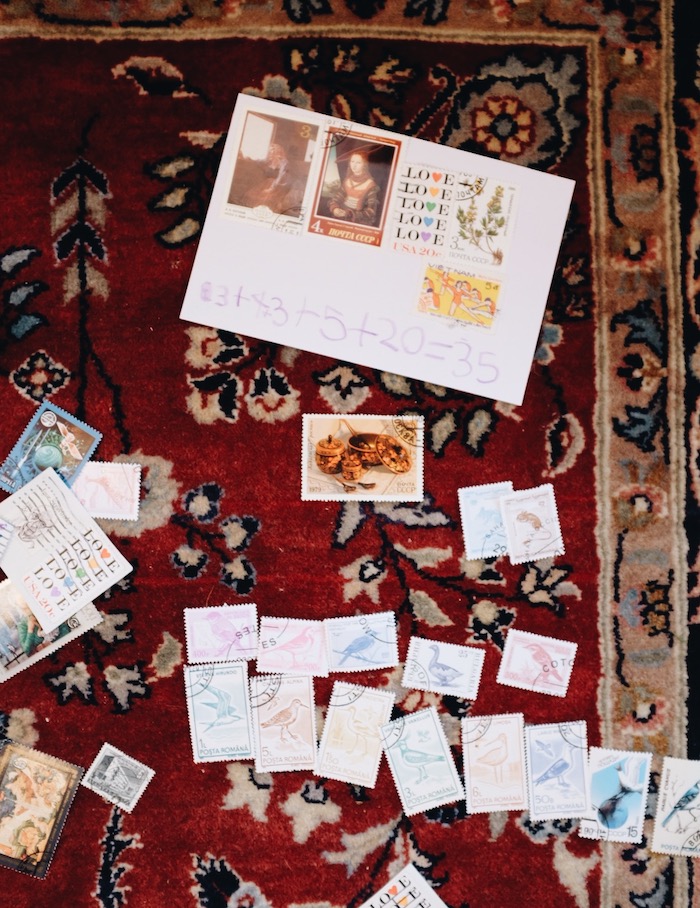
I’d love to know how much time you spend on schoolwork, and what the girls think of it – especially Lux, since she went to a brick and mortar school for a bit.
We spend about three hours on schoolwork a day. There is some reading aloud and tons of (voluntary!) reading alone time in addition to that, but I like to be done with most of the group and individual work by lunchtime, if we begin around nine.
They seem to love it. If they were asking to do something else, we’d likely be doing it!
Lux was originally tempted into homeschool by observing the material her younger sister was learning through Classical Conversations when Lux was going to public school. We noticed she was very engaged in the material and often asked to study with Joan. On the mornings when she would ask to stay home, we would say she was welcome to homeschool next year if that was what she wanted. And she often said, “yes! That’s what I want.”
Lux remembers school very fondly and is nostalgic for aspects of it. Occasionally she will make remarks that reveal how loud and chaotic she found it, how the waiting and lining up was frustrating, how repetitive the reading material was and how that bored her. (These are things she either couldn’t articulate or simply never mentioned at the time.)
The things I remember are how little ownership she felt over any projects completed in class, how she was gone the whole day and couldn’t manage to get along with her sisters when she got home though I could see how badly she wanted to, and the general sense of edge-softening/dulling that seemed to happen to her unique curiosities and spirit.

I’d love to know what you’re using, what your days look like, and how you balance school with the little ones!!
We are using :
-Classical Conversations: “CC” A weekly group meet up with a memorized curriculum in seven subjects, science experiments, and fine art experiences.
-Sonlight Curriculum’s history & literature (about an hour of reading per day lined up for the entire year, 3-4 different books daily). This curriculum has a Christian emphasis but most of the titles are not specifically religious.
–Handwriting Without Tears cursive (love the style of these books!)
–Explode the Code phonics (Joan adores these)
-Life of Fred math & everyday math engagement with things like postage stamps and road signs
The newly three-year-old would be the first to tell you she does school. In fact at the doctor’s office when they asked her what was one of her favorite things to do, she said “phonics!”
But really, the morning school hours can be boring for her, and she has to learn to be as least disruptive during this time as she can. It is amazing/delightful to see how much of the material she will engage with. She’ll ask what a word I just read aloud means. She’ll attempt to and sometimes successfully memorize the same material as the girls (a two-year-old singing Latin declensions is unbelievably cute).
She has her own books, crayons, notepad, and letters that come out during this time. None of them catch her attention for long…which is totally normal for that age and I don’t get discouraged by it.
And after each morning session, I gush over how patient she was, and we get a stack of books and read them together, just she and I. Then too her sisters have hours of the day after lunch to play with her and include her in their games—what could be more amazing?
Are you still able to do CC in Vermont and if so how is it going? We started it with my 4 and 6-year-old when we moved to Florida.
Yes! For each house we looked at while house hunting, I used the zip code check to see what CC was in the area, and often reached out to the leader to talk and ask questions about the town and community.
It didn’t determine where we purchased a house, but I would have been surprised/concerned if there hadn’t been a community within 45 minutes.
I know so little about homeschooling, so I’d love to find out how you homeschool three different ages at once. // It interests me so much but I don’t know much about it. Would love the basics including how you handle 3 different ages.
The primary approach with the reading is one-room-schoolhouse style. I read books aloud that the seven-year-old could theoretically read aloud to herself (though she would avoid them because they appear boring) and that the five-year-old may understand most but not all of the material therein. Sonlight Curriculum makes this easy by shipping you a box of books for those ages and laying out the schedule for the year.
But one shouldn’t think they have to pay lots of money to do this kind of thing. There are lots of free programs laid out online and you could compose it with library books and used book purchases in advance. Ambleside Online is a good place to encounter this world.
For CC, the girls memorize the exact same material. The older child is likely grasping the geography of ancient Mesopotamia in a more concrete way than the younger child. And it’s a little easier for her. But they both work at the same thing.
Handwriting, phonics, and math are individualized to their exact level. It takes us about 15-30 minutes with each to do each subject.
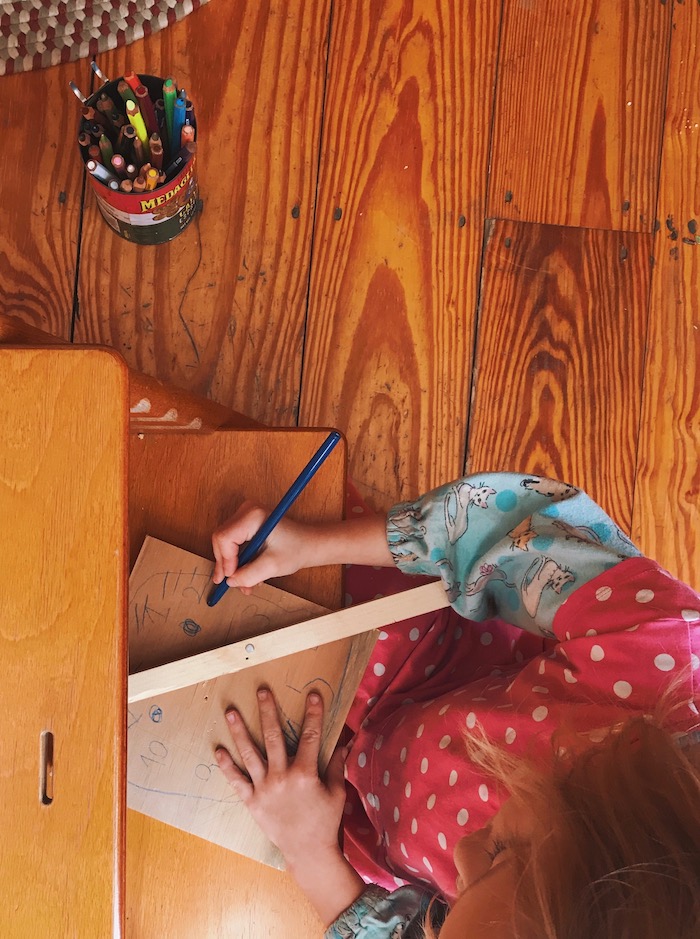
Do you have any suggested reading for those who don’t homeschool but would like supplement with the classical model?
You might enjoy purchasing Classical Conversation’s CDs for the car. Begin with the history sentence songs and see what your children think. I guess they would likely eat it up, and ask you to play it again and again. The Story of the World is also a wonderful book & audiobook (there are four volumes) that can enrich any daily life with history.
Another way to experiment with the Classical Conversations material is to download their app for this year’s cycle C1 (I can’t recommend other cycles as I think they have not been updated). My girls love this on their iPads and they casually review, I’m not making this up, 12 weeks of material in one trip to Boston. Excellent ancient world geography graphics here too.
Geography is a big part of classical education, so I have one more app to recommend: National Giraffic. It’s tough but excellent and fun! I think ages six and above for this one.
I’d love to know more about how to pick a curriculum… And yes, also more about balancing homeschool with multiple ages (my kids are 7 and 3).
This is a tough one because it has so much to do with your preference for emphasis and your child’s interests. If you know anyone homeschooling, you can begin to ask around and learn that way. Check what CC group is in your area (see above for the zip code link), email them and ask to visit and observe a meeting for a day—what’s the harm? I had heard of Classical Conversations for at least a year before I checked it out, and I was originally not interested. Then because it was for my four-year-old, and I had little to lose, I decided to just try it. I wish that I had just looked into it earlier, instead of steering around it.
Sonlight Curriculum’s website and the catalog does a great job of reviewing lots of curriculums for math, handwriting, phonics etc. Click around their language arts section and just see what appeals to you. After that google the names, and you’ll likely find homeschool bloggers talking about why they like it.
I got to see Sonlight Curriculum’s reading style growing up because my mom did it with my little brothers, which is why it was familiar and appealed to me.
For me, her approach was more of an unschooling style, plus I couldn’t grasp reading until “late,” around nine-years-old. Once I could read I embarked on my own curriculum of reading everything I could get my hands on, for hours every day.
The vintage book I review here might be an interesting armchair read for you. It goes into how she organically found a curriculum of sorts and how it morphed over the years.
Do you plan on sending them to a traditional school when they’re older?
I think so. I’d be surprised if we were still homeschooling after middle school. Perhaps if an alternative path became tempting to them—like if one of them wanted to go to culinary school, live abroad, become an engineer, and wanted to complete high school on the side.
As a kid I was homeschooled, transitioned to high school, and though I feel like those years had a lot of wasted time sitting in classrooms, I also loved the sports, theater experience, and close friends that came out of that time.
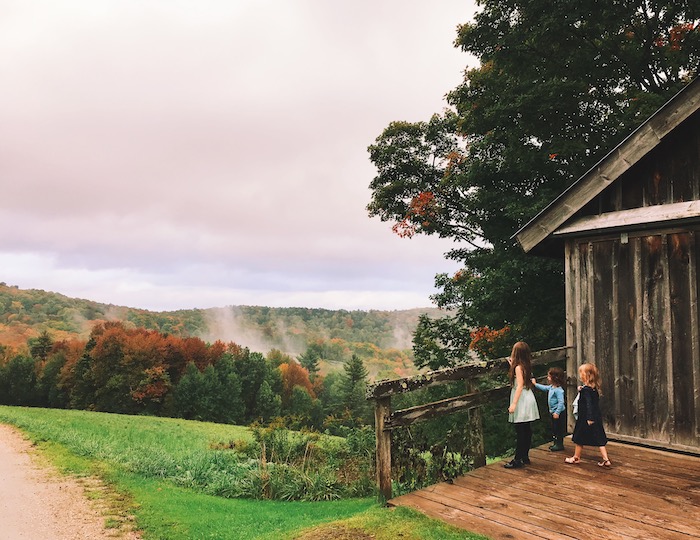
Do you feel pulled in lots of different directions? I feel nutso helping my 11, 9, and 6 year olds with homework after school with the 3 yr old cruising around…in my head I multiply that painful 1.5 hour of the day to equal a day of homeschool ? my kids beg to homeschool (their cousins do, and so does our babysitter) but I’m also worried I’d let a lot of things slide under the guise of “relaxed” schooling or “unschooling” or “guided learning.” I guess my question is…how do you be the only adult in charge and stay that way?? ?
Keep in mind you are dealing with your kids after they’ve already had a totally exhausting day at school. Energy is low. Attention span is even lower. Interest level in the topics…probably all time lowest. Deep in their minds, they are processing all the social interactions and moments they had, whether to bring them up to you, what they meant, wait why did that happen, etc.
I’m reading things aloud that the girls say, “please keep reading!” when I’m done. They are proud of their memorization skills. I get to see them have the “aha!” moment with topics and work through them. Yes, it’s for sure distracting to them when the three-year-old interrupts every seven minutes with a random question.
Your older two would probably have quite a bit of solo work that they would be responsible to complete on their own (and could probably do in 15-20 minutes what would typically take a classroom “hour.”). The Unlikely Homeschool could be a good resource for you here—I’m not as sure about what the great curriculums are for those ages.
And you likely would have things that felt relaxed to you! Because as soon as a kid is interested in something (and they are able to read), they can often take it from there. That would feel easy, but in fact, you’d be watching as they took an interest and turned it into a passion, conquered it, and picked a new one.
Wondering how Lux is feeling about homeschooling after being in public school; and whether any of your daughters are extroverts, and if so, how you meet their need to gab & interact with lots of people all the time. (We’re thinking about homeschooling our kindergartener once the school year is over and these two issues are heavy on my mind!) // Do you feel like your children are getting enough “socialization” at home? Is that ever a worry for you? My husband and I are both introverts and I feel like our daughter is very extroverted, but I also feel like I was extroverted as a child, but a lot of school experiences made me more shy and introverted. I sometimes feel like I’m depriving her of socialization just because we would rather take a walk around the neighborhood as a family or go for a hike than spend the day with other families, even if she does seem perfectly content with these activities.
Yes, the oldest is an extrovert. That aspect of her is something I’m very sensitive to, and as a mom, I go a little out of my way to make sure she gets engagement. Whether it’s paying special attention to her request to take a class, a play date that takes some planning to make happen, potlucks, church Sunday school, willingly signing her up for sleepover camp, and just keeping tabs on how she’s doing.
In general, I don’t believe traditional school offers the unstructured social time extroverted children crave. I also don’t believe children need as much peer socialization as is often implied.
What’s working?! I feel like it changes a lot and sometimes my “philosophy” has to bend a little to make the day go smoothly.
What’s working for me right now is to strive not to take it for granted. Life feels brief, childhood feels even briefer. There are lots of moments that would feel easy to shrug at–giggling at Winnie-the-Pooh’s old fashioned language together, the girls reading to each other on the couch, cheerfully playing each other’s games with absurd rules, widening their eyes with curiosity at a new idea or topic, finding a new favorite aisle of the library to settle in for an hour.
These are in fact moments that are absolutely unique to a very short period of life.
all of the above and how you self care? really looking forward to this post ?
Once I decided that 3-4 hours was sufficient for what we wanted to accomplish each day, I became pretty clear that my on-call time was done after that. At lunch, I’ll say, “what will you guys do this afternoon?” If I’m reading or writing and they keep (joyfully, no doubt) coming up to me with various remarks, I’ll tell them it’s distracting and I want to be left alone for a while.
If I’m doing any kind of housekeeping, I try to make sure they are aware of what’s going on and are asked to help however they can.
When I first considered homeschooling, I had a secret theory that most moms doing it had a hack that was helping them. A husband with a flexible schedule. A mother-in-law down the street. A house cleaner. A babysitter for a few hours a day prepping dinner and playing card games. (I mention this survival theory in my review of this book.)
And for the most part, I’ve found this theory to be proven true. My hack is that Joe is now working from home. And though he disappears into his office for hours at a time, he is still an adult presence in the vicinity and this goes a long way. He can stop by when I’m prepping dinner and chat for a few minutes. He eats lunch with us and quizzes the girls about their morning. He can stay with a sleeping baby if I run out to do errands with the other two. These little things help a lot.
Admittedly, I’m not getting ninety minutes of silence every day. I’m not even getting sixty minutes of silence. It’s a phases of life thing. Cuddling kids on the couch and read books. Hear their creative story unfold as they quietly talk to their toys. Wake up slowly and make pancakes. Put my feet in front of the fire and say, “wow I did that today.” Feel totally normal sprawled on the library floor playing Candy Land with all the wrong rules. Spend an afternoon worrying over a random fever and questioning a nurse closely over the phone. I get those things.
Like so many aspects of motherhood, the decision to homeschool can immediately become burdened with guilt. It’s all on me and I’m not doing enough crop up frequently. Signing up for too much and feeling like a failure when you can’t pull it off. Giving up as a result. It’s very important to avoid this for one big reason: If you are providing consistency and respecting the level of interest your child is at, it’s very difficult to screw this up. Honestly. The child’s innate curiosity and drive will win out.
Thank you! Lots of love.
-
Article of the year

Of all the articles I read this year, I’m still reflecting on one from July written about Gwyneth Paltrow. The writer, Taffy Brodesser-Akner, was cleverly both infatuated with G.P. and entirely aware of the aura that GP projects and the success that perhaps naturally follows it. There was a slightest touch of snark as she examined the hype of everything goop and the millions in profits involved therein, yet it was sisterly and affectionate and comfortable to read—like a fashion profile.
She wasn’t going to have more kids. That she also knew. Her business, her age, which is 45 — not impossible, but still. She’d wanted a third. She told me that after she asked how many I had, and I told her I had two children as well, and it was wonderful, but I was sad I didn’t have a third.
She told me I should rethink it while I’m still young enough. “All I’m saying is it’s not nothing,” she said. “I really wanted another one.” I nodded solemnly. (Later, I cried.)
I don’t read the goop newsletter, though it is exactly the type of thing I would imagine myself reading because I do like lists and recommendations. But a little over a year ago when goop began marketing vitamin combo packages with names like high school genes and why am I so effing tired? it was hard to look away from the brilliance. As a veteran (and believer!) of many chiropractic and acupuncture offices, I am well aware that statements about, and the manufacturing of, vitamins and minerals are not monitored by the FDA. They can be made, dosed, and recommended on just about any level. The idea of ditching the bland white plastic bottles in the smelly health aisle, sexily repackaging them and associating them with a luminous celebrity is….ridiculously smart. The idea of marketing them to tired moms who are most likely very deficient in something, is also genius.
So she was on my radar but I hadn’t been following the goop wellness summits, and I was honestly stunned to read about how successful they’ve been. I loved the way the writer stepped into the GP culture and joined it, yet couldn’t help some relaying it back to us with bemusement and a goofy dose of skepticism:
There were stories that talked about bee-sting therapy (don’t try it; someone died from it this year) and ashwagandha and adaptogens and autoimmune diseases — an autoimmune disease at every corner, be it thyroid disease, arthritis or celiac disease; trust them, you have one.
But something deeper about American privileged society was unpacked in the article as well: the idea of self-care. Here is Brodesser-Akner summing it up so well; it stayed with me in the months after I read the article:
The minute the phrase “having it all” lost favor among women, wellness came in to pick up the pieces. It was a way to reorient ourselves — we were not in service to anyone else, and we were worthy subjects of our own care. It wasn’t about achieving; it was about putting ourselves at the top of a list that we hadn’t even previously been on. Wellness was maybe a result of too much having it all, too much pursuit, too many boxes that we’d seen our exhausted mothers fall into bed without checking off. Wellness arrived because it was gravely needed.
Before we knew it, the wellness point of view had invaded everything in our lives: Summer-solstice sales are wellness. Yoga in the park is wellness. Yoga at work is wellness. Yoga in Times Square is peak wellness. When people give you namaste hands and bow as a way of saying thank you. The organic produce section of Whole Foods. Whole Foods. Hemp. Oprah. CBD. “Body work.” Reiki. So is: SoulCycle, açaí, antioxidants, the phrase “mind-body,” meditation, the mindfulness jar my son brought home from school, kombucha, chai, juice bars, oat milk, almond milk, all the milks from substances that can’t technically be milked, clean anything. “Living your best life.” “Living your truth.” Crystals.
I was so struck by this encapsulation of the last twenty years because I’ve never pursued having it all. It didn’t appeal to me, and I felt immune, as woman and mother, to its call. But perhaps I felt immune because I was in fact susceptible to an entirely different call, one that I have actually worried over: was I caring for myself well enough? Should I be doing a better job of caring? Was it ok that I hadn’t been to a gym since the birth of my first child? Was it ok that I only went to a hair salon once a year? Was it ok that I liked coffee shops more than yoga studios? It felt ok, but was it really?
And in that odd way that happens after you’ve named something to yourself, I started noticing all the times people brought up self-care around me. As a recommendation. As a sales pitch. As a reflective summary of their weekend. Something they’d really been meaning to do. A goal for the month. It was constant. And where I’d been nodding along before, smiling in affirmation, now I began freezing the frame in my mind. Spinning it around to look at it. Why? Why were we all supporting each other in this self-spiral? Why were we acting like some sort of happiness was going to come from this—in many ways, just a new way to spend money?
Because we are sad. Because we are lonely. Because we feel unfinished and incomplete.
As a believer in Jesus and the promises of love and acceptance that He brought, it is my belief that the self is not a truth. The self does not contain peace or happiness deep within it, only to be revealed by pink quartz. In fact it contains loathing and despair. It contains deep dissatisfaction and loneliness. The joy and peace comes from outside of us, from the love that Christ offers us, we only need to accept it. As the profile finished, the writer’s jovial tone began to pace with a sadness. She shared her discouragement as a way to belie the exuberance written around GP and the summit. Even as I knew she was using her discouragement as a way to stay relatable to the reader (and the modern, disillusioned, no-truth times), I still wanted to hug her and say to her, to all of us, I guess: there is peace! There is joy! But it’s not in yourself.
-
letter from a reader

A reader recently wrote me to ask about socialization when staying at home with a three or four year old. Such good questions here that we all tumble through. I thought I would share her email and my response.
Hi Rachael,
I have been reading your blog for a long time now (do all of the emails you get from strangers begin this way? Probably.) Anyway, it’s true. Since before Joan was born!
I’m now lucky to have two girls of my own. 2.5yrs and 6 months, so we are still in the trenches of learning how to handle two kids. I’m writing because I’m considering pulling my 2.5 year old out of preschool next year. She has been going to the sweetest montessori program two days a week. It’s been good for her – and good for me to have some time with just the baby. Despite its benefits, T. is clearly exhausted by school. We will likely be moving before the next school year and the only Montessori program in our new town is 5 mornings. I’m not sure she can hack 5 days and I’m not sure I can do the get-to-school scramble 5 days in a row, especially bc Dad travels 5 days a week for work. Okay, enough about our predicament. I’m wondering how you handled socialization for your girls when they stayed with you at ages 3 and 4. Did you opt into specific programs? Hit the library story time circuit? Or just plan play dates? Do I need to join a gymnastics class or something?Another lurking question re schooling is: do you think the socialization is important for the kid? Or, mostly for mom? Having been home for almost three years, I fully know my needs for socialization and structure but I’m not sure my daughter’s mirror that. Because you’ve been on the other side of 3 years old twice now, I’m wondering: did you see this increased need for socialization? How did your child staying home blend with the choice of the majority of the families? I guess the bottom line is (and isn’t it always?): if I make this choice primarily for my sanity (not rushing to school 5 days a week), will my daughter be left wanting?Dear A,
I completely relate to your question, and absolute affirm your suspicion that five mornings a week will be too much! The needs of staying home with a 3 or 4 year old is up to the child. The fact that you’re writing at all tells me that your oldest is probably quite social, i.e. if you haven’t made any movements towards going out she might ask, “What are we going to do this morning?” In this situation, which was the case with my eldest as well, I tried to plan things 2-3 mornings a week. Typically I planned these things a week in advance, or over the weekend. 2-3 mornings give you that every-other morning off to stay at home, which is important.
Regarding the concept of/concerns about of socialization as a whole: when Lux was entering kindergarten at age five her new teacher expressed concern that she would have trouble adapting to the school environment. Not because of anything the teacher had observed in her, but because it was assumed if you haven’t been adapting slowly over time, then it’s going to take awhile to fit in. But she adapted immediately, listening with delight to instruction and thriving in the structured environment–both a welcome change for her from home life! She had never had another adult as an instructor, so it was a novelty and she was intent on listening carefully. She’d never had the chance to observe peers for extended periods of time, so she came home and recited all the odd things other children did.
She returned to me in the afternoon exhausted (cranky, snippy), unaccustomed to mingling with her young sisters, and eager for individualized attention. (This compared to what we had before. Our life was outburst free before school-fatigue set in.) “That’s so crazy!” her teacher remarked when I commented on this, “She’s an absolute dream at school.”
Therein lies the great school conundrum. Group-think, traveling as a pack, chatting and running with a gang of children is really fun. But every day for eight hours, it is completely exhausting.
Joan attends a local Classical Conversation group that meets once a week (as they all do). (Find one here by typing in your zip code.) She loves her teacher, her presentation time, and adores her group of seven buddies, as well as her recess time with older kids. She is tired out by the end (1pm) and enjoys the rest of the week at home, asking about her class only one or two days before it begins again. Everything in moderation is the great boon of home life. Had I know about this program when Lux was four, I know that she would have loved it as well.
I remember being at the playground with Lux when she was four and a local day care would show up. She told me she was envious of all the kids running around together. I was sensitive to that longing, but I also don’t think she realized how joyfully she giggled and plotted with her little sister all day, the long uninterrupted moments she spent paging through books on my bed, the stories she quietly told herself as she drew for far longer than “art time” would have allowed.
In my extremely limited experience I have never observed a child who did better because of earlier adaption. Personally I follow research that suggests the more children are one-on-one with adults, the better they do in social settings with their peers. The more they are only with each other, the more unstructured (and natural to their age–selfishly) they behave. (One of the best books written on this idea is from 1989, Dorothy & Raymond Moore’s Better Late Than Early, but you can read some of their ideas in this article as well.)
However, I have seen children who parents are not comfortable with discipline of any kind. They are unwilling to say no to their child and do not follow through with any of their voiced threats/consequences. They are eager for the relief and enforcement of other adults in their child’s lives. In this circumstance, I completely understand that a school/structured environment would return a better behaved child to the home.
Moving to a new town and opting-out of preschool means you will have to be a little aggressive with grabbing folks’ phone number initially. And just shrugging it off when lots of people you meet either work or does not have their child with them in the morning. I promise that there are other people choosing their own adventure education-wise, but it might take some digging to find them. In a new town, an organized class is not a bad idea because you’d have that initial organized chance to meet other moms. However, I find most programmatic things (even library story times) do not offer a chance to get to know other moms. You end up spending the time interacting with/managing your child and their expectations rather than chatting. But a library story time was the place I first met several of my best local mom friends when Lux was little. That was because I aggressively chatted up two interesting women with babies the exact same age, then I suggested we go out for coffee afterwards, and finally one of them said we should trade numbers. We never went to the library together again, instead we met at each other’s houses for the next year.
Ideas of things I would plan, as you feel the need:
-The library on consistently the same morning, probably not the morning of story time (when it is often flooded with people). If I met anyone there, I would say “see you here next week?” or I would exchange numbers, and text the day before, “Planning on the library tomorrow, will you guys be making it out?”
-A standing playdate. These are fantastic because they don’t require planning ahead of time. Ideally you create a loop and host every 3-4 week, but trading off works too. Making coffee and muffins for friends or trying out a craft on a lark is much more fun than by yourself. My friend Noelle–who, it must be said, lives in California–met up at a park with a friend she met via Instagram. They called it Preschool Breakfast. She says…
We would meet once a week at a park (actually the coffee place next to the park first). We would both pack snacks for the kids to share, which they loooved and of course always wanted the other kid’s snack first. Azusa and I would talk about cooking. We would always ask the kids what they had for breakfast that morning, but they almost never remembered. They ended up at different schools now but we still hang out once a week!
-Babysitters: I have always felt best when I’ve had at least one three-hour babysitting session a week. Not for errands, but for adult consciousness things; anything restful and mindful. Reading magazine at the bookstore. Calling an old friend. Writing at the library. Sitting in my car on Pinterest. Take some of the money saved from preschool and put it toward this endeavor. I like coming back just before nap time/quiet time. Emphasize to the sitter that she is not entertaining them but is playing with them, following their lead, stepping back one they are happy enough by themselves. That way when you come home T. won’t act like she just got dropped off after a morning at the fairgrounds. When you hire this weekly sitter, make it clear you will need one or two tasks done during the time as well–all the dishes, tidying the office, vacuuming the living room. This is what you would ask of yourself, so it’s not too much to ask. But it is easiest asked upfront.
-Errand-Coffee-Walk In the words of 600sqfeetandababy, “My cup of coffee is one of the only things I do for myself each day and therefore I love to treat it very seriously.” (I can’t find where she said this, but I love this quote and have remembered as best I can.) If you have a weekly mom-scheduled jotted down, even something of the groceries-coffee-walk variety becomes a “thing” full of the rewards of accomplishment and fresh air.
Please feel free to respond to my admittedly extremely-limited experience with thoughts in the comments. I have some other emails I’m going to dig up and post here as well. If you have a question too, feel free to email me at rachael.ringenberg@gmail.com. x
-
advent word: awaken
and the light shines in the darkness, but the darkness does not understand it. -john 1, verse 5
To drive our family to the Midwest for Thanksgiving, we woke the girls up at 4:30AM. Rather than waiting for them to gain consciousness, we began sliding their shoes on their still-sleeping legs, tucking their limp arms into their jackets. We murmured what we were doing as they woke up mid-dress change. They walked outside in the cold moonlight with us. Once in car, they fell back asleep, which felt like a great success: to cross and recross the woken line so easily when typically this line is fixed: once woken, they are awake.
An eerie moment among Jesus’s healings in the Bible is when he tells a dead girl lying on the bed where she died, to wake up. It feels profoundly off-territory—-a man telling another man’s daughter, whom the father believes to be dead, to simply awaken instead. Perhaps the father wondered if he had seen her clearly in the first place. And yet it is a moment of glorious upsidedown: the line that should never be crossed–a child dying before the parent–had been crossed and recrossed.
One layer of the parenting shroud (and there are many) is that you do not see your season of life for what it is. Fondly looking backward and warily looking forward, it’s difficult to evaluate what a stage will mean to your being for the rest of your life. To awaken to your circumstances, your actual life, the decisions you’ve made and where they’ve brought you, the gifts you were given that you did not ask for, is truly a challenge. Often the awake! command is brought on by discomfort, discouragement, or interruption.
The idea behind a prayer journal is that you might reflect on the prayers you once had that were answered. Oddly, without documenting them, these prayers can flee your mind as soon as they are resolved, replaced by new ones. When I encounter a friend I haven’t seen for months, she asks me about something I was worried about last time I saw her, and I stare blankly back at her. Oh, I guess we figured it out, is often my response.
My aunt practices healing of various sorts–acupuncture, herbs, tapping. In that last method, you ask the patient to gauge their pain levels numerically between 1-10. This is important, because as the pain ebbs away, people will quickly forget how they felt moments ago. Or sometimes that pain will be solved, but a new one will speak up quickly, and the mind switches to anxiously centering on the next one.
In daily life, I’ll snap out of peaceful/absentminded parenting when the toddler cuts it too close to an intersection, or one of the girls pushes the other in impulsive frustration. Trotting along cheerfully until I suddenly find myself saying, “Hey! what is going on here???” then we all sigh and look at each other.
Anger is one of those emotions moms like to keep their distance from. Lots of confessions around anger amongst coffee cup chats. However, kids really don’t seem to mind anger. They embrace it whole heartedly themselves, screaming with fury from the youngest age when they are taken aback by something. Anger is the abundance of feeling. My children gaze at me frankly when I am angrily describing what I am angry about. Recently: “Why is everyone here acting like what they want is the most important? I am doing things for you all day, you can also do things for me, and for each other. That is important and it’s how this household works!” <shout, at the end there>
I am one of those who shyly comes up later in the day and whispers, sorry for yelling at you, i was frustrated. They shrug at me, usually smile, ask where their scissors are and if they can have a snack.
I encountered a list of Advent words proposed by Anglican/Episcopalians and I liked the idea of responding to a few of them throughout this month.
-
clear and present postpartum
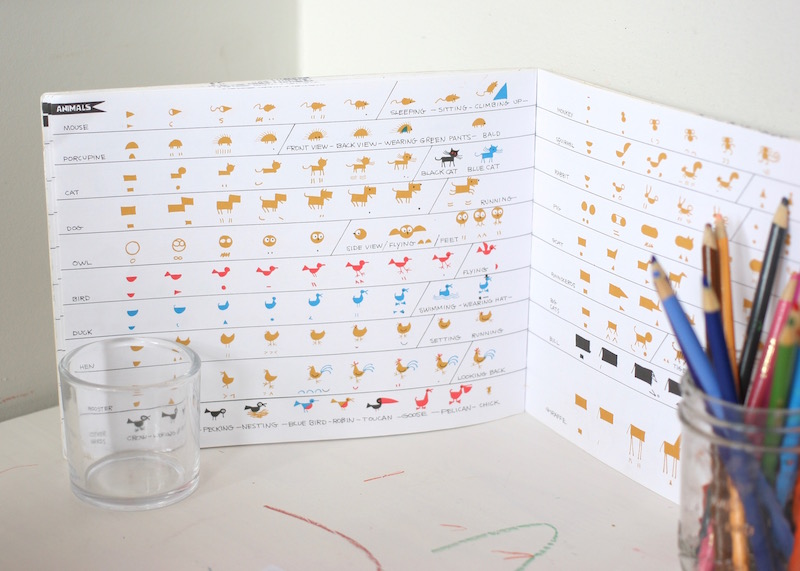
I’ve been meaning to link to this superb writing on postpartum depression on Katrina’s blog. I have experienced moments like she describes and I think she nails the elements exactly. The buzzing thoughts, the way the dark moments can tip the scale, the physical notes that come into play–eye contact, smiles. An excellent read, particularly if you’ve had friends go through this, or brushed against it yourself.
A bit of back story, so you catch the details: Katrina, a calligrapher, painter, and devoted Catholic, gave birth to her baby girl with two young boys already tumbling about her in a tiny space on campus with her husband deeply into graduate school.
-
moving city
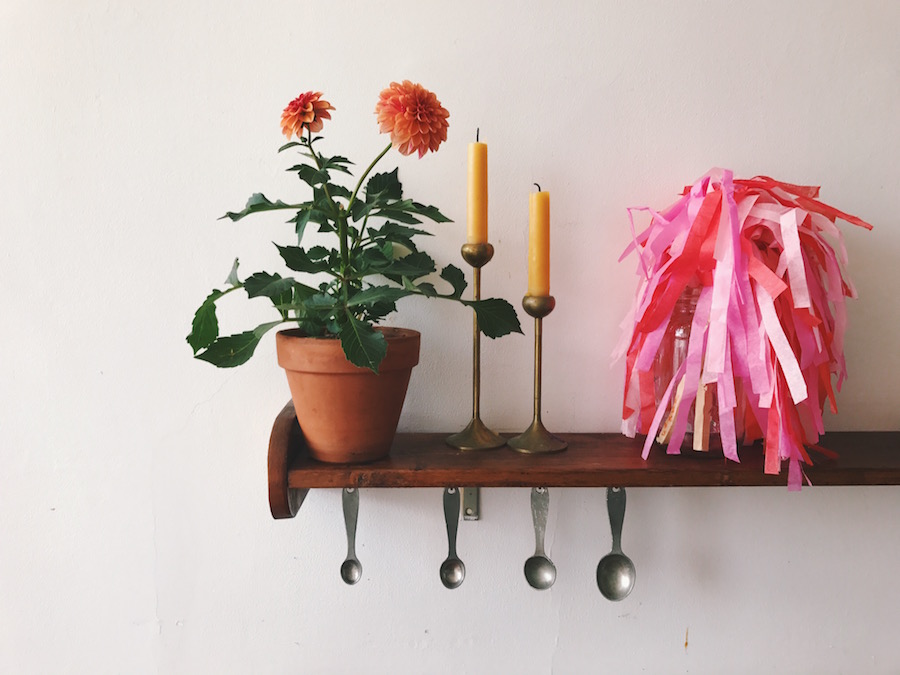
We are apartment hunting which has me deeply nostalgic for our current apartment even as we live here for a few more months. Reminiscing the present is like writing a greeting card to yourself every morning when you wake up. Things become overwrought with significance.
It was originally our landlord’s idea, but once he suggested it, it felt right to us too. Comparing us to us back at our apartment tour, we now feel just a percentage too big, maybe 15%.
Four years, two infancies in our bedroom, a few rooftop drinks, lots of sleeping-in with light blazing onto our pillows (the eastern reach of the eastern time zone), watching rain fall over the park from the windows, watching the tops of the trees change from flowers to leaves. Actually, much of life lived through the windows, often open on both sides like a railroad car, like a porch you happened to enclose with brick walls and place sixty feet in the air.
Joan helping me in the kitchen, Lux in the bathtub, listening to The Last Battle, the sound of the narrator’s British accent coming through the door over her light splashing.
Lux watching the Hancock Tower’s weather beacon visible from her window and reciting the code to us as if it contained predictive magical powers: “Steady blue, clear view. Flashing blue, clouds due. Steady red, rain ahead. Flashing red, snow instead.”
The mice, a revolving chain of them, heedless of the abrupt disappearance of their elders.”I just saw something scamper in the kitchen, it looked like a bird, but I think it was a mouse.”
Four years with just a bathtub for bathing (such a lovely old fashioned word), fun years where I mentally added shower to the amenities I would enjoy on vacation, even when we were just staying over at a friend’s house for the night.
It’s hard to leave a stage you still love.
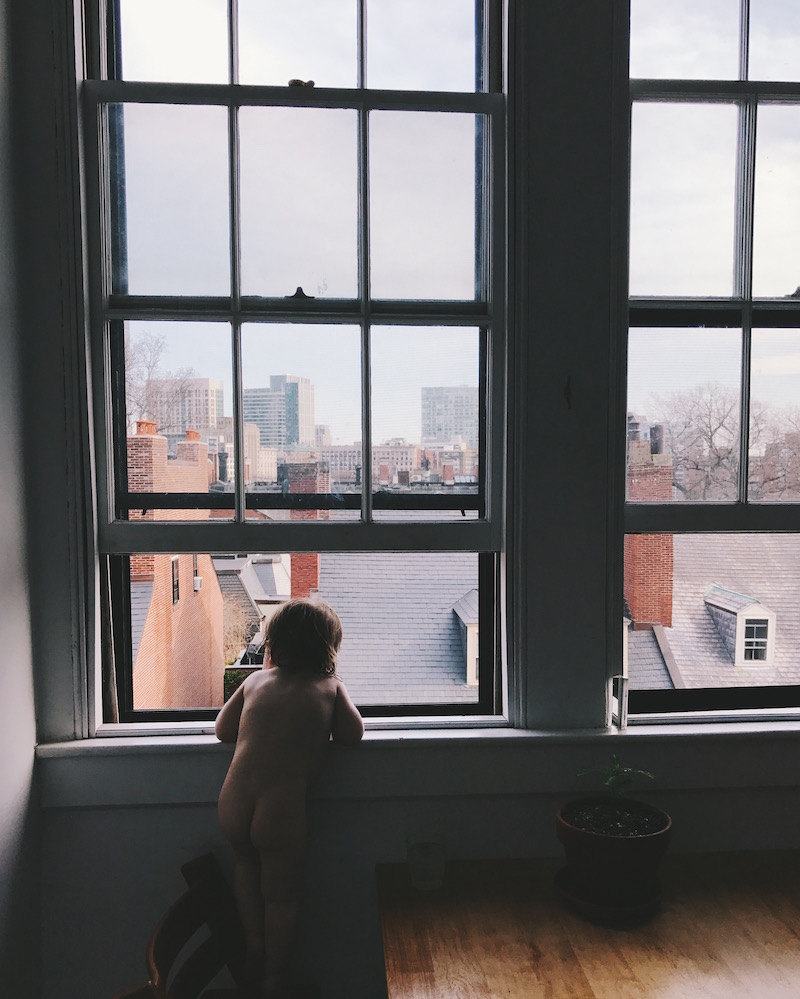
Because we still love it, we have become persnickety rental hunters. We have no interest in replicating our space, we want everything we’ve loved so far, but more! Small, quirky, south facing windows, wood burning fireplace, pets welcome, heat & hot water included, washer & dryer, quiet at night, a real patio, wood floors, same fifteen minute commute for Joe. Because this Christmas list continues to be a hopeful prayer of mine I will avoid blasé language, but suffice to say Boston’s rental market is not in the business of making dreams come true.
Around this time of year I often visit friends with yards, kiddie pools, sidewalks, climbing trees, front porches, and extra bedrooms, and I have to stifle my awe of it all. Act natural like them. They shrug at the grandeur, “well, we’re thinking of re-doing the kitchen.” Their children totter from thing to thing, express boredom, ask for snacks. I become overwhelmed by the probability that my children would act the very same way in such circumstances, instead of turning into joyful competitive cyclists or champion swimmers like I secretly imagine.
(that said, I affirm any dissatisfactions with space, no matter how much of it. Having looked at approximately two hundred real estate listings, I believe we can say that space does not equal human comfort–comfort typically found in things like light that pools on the floor, windows that open, hearing your family while you cook, a room looking clean after you’ve cleaned it, the way a wall can expand a room instead of dividing it.
Is it odd or totally natural to experience deep identity crisis with a new home? Why are we as humans always leaning into things to make them who we are. Must your clothes, job, children, home, aspirations, facebook profile remind you of your value?
Naturally the girls hate the idea of moving. Like a loyal friend, they sing the praises of our current space (“Isn’t it so quiet on this street Mom?”), brush over the negatives or simply don’t see them (“I don’t want to say this out loud around anyone because I might hurt their feelings, but we live on the top floor.”)
You could make the argument that fertility is arranging this need for a new apartment. We have outgrown it. It worked for the 3rd infancy, but with all five of us walking now, it feels clumsy; the enforced minimalism more insistent than we want it to be.
Fertility can seem like a moving walkway that keeps turning me into new things and handing me things–infancy, baby, kindergarten, drop off and pick up, doctors appointments, feeling late a lot, nights on zappos analyzing miniature sandal straps, grocery lists peppered with apples and peanut butter jars, afternoons that begin when I pack the snacks and end with a bowl of tuna fish between us on the floor, me scooping spoonfuls into their mouths.
To some extent I feel like an active participant, in others, like leaving this apartment, I feel like decisions were made by some other creature.
-
a book in context
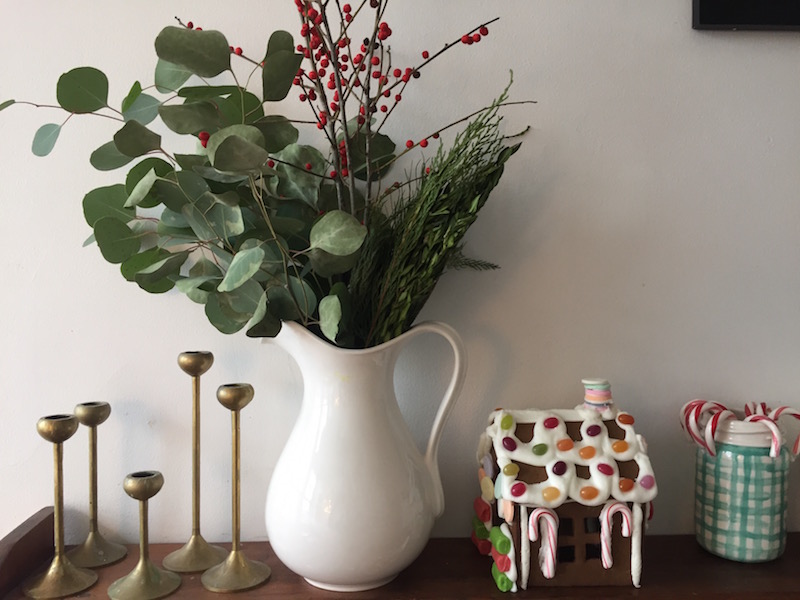
I started the The Good Earth, published 1931 by Pearl S. Buck, mid-December in the two weeks after Joe’s brother died; wretched strange weeks when the girls and I were sick with one morphing virus, a flu-cold, flights were delayed, our planes home sat on the tarmac then skid into airports hours late, we seemed to tuck them into bed, fall asleep listening to them cough, and then drag them out again before the sun even bothered to wink awake.
At the memorial service for their uncle the girls crumpled with me in a back row in grumpy feverish moods, wiping their snotty noses over and over, hiding their flushed faces in their elbows as old friends of the family stopped to say hello. The service was beautiful but our children weren’t, a fact that both prickled our pride and seemed fitting. One family member dead and well remembered, the rest alive and hard to look at. Each morning I woke up expecting our hack-coughs to be emptied overnight, no. Meanwhile our hero Wang Lung gratefully accepted his morning bowl of hot water, in bed, served by his new wife just after she carefully stoked the fire and served another bowl to his father.
Naturally there was no mention of Christmas on the pages of The Good Earth–though there is occasionally a fearful and fitful devotion to various gods, grabbing an incense stick when things seemed worrisome, cursing them loudly when things fell apart. Wang Lung’s marriage to O-lan is pragmatic, met with unexpected kismet and peace, yet there is still the unerasable impact of O-lan’s deprived childhood–the details of which are eluded to only vaguely. Wang Lung made no move, ever, to fix or soothe what had happened to her. Meanwhile I chased the girls with ointments of various types, devoting fifteen minutes to cajoling a smear on their red skin that was raw from their furtive side-wiping. The girls seemed to collectively give up eating, their proud young playground muscles almost immediately disappearing into knobby knees. At a certain point all three began to watch me as nothing but a kleenex threatening an attack on them. I fell into the role, really, it was almost impossible for me not track their snuffles and new symptoms with a graph chart.
Steadily I closed my senses to the american christmas hoopla around us that did not frame our Christmas this year at all. The sweet heaven-bound songs of the memorial service rang instead of carols, toast and soup replaced hot cocoa, sleeping late and watching movies, often oblivious to the accomplishment of festive traditions around us. Joe and I mostly looked at the girls, but when we managed to look at each other it was difficult to avoid the topic of missing Ross or preemptively imagining how sad this or that were going to be without Ross. Steadily Wang Lung remained devoted to his land, wholly disinterested in political events in his country and often oblivious to anything beyond the demands of his social structure. The narrative pours out like hot tea, the irony-free meditations faintly fragrant and soothing. Pearl Buck was the child of American missionaries, she held the duality of American and Chinese worlds in her mind, but she loved the Chinese one most, I think. Her flattering sketch of the countryside, the affectionate description of the “loaf of bread wrapped around a stick of garlic,” the laboring, planting, harvesting, well-earned resting that framed Wang Lung’s noble year. The pre-revolution farmer peasant world was harsh indeed, but you can tell she loved it. The GOOD earth.
-
Grinching triumph
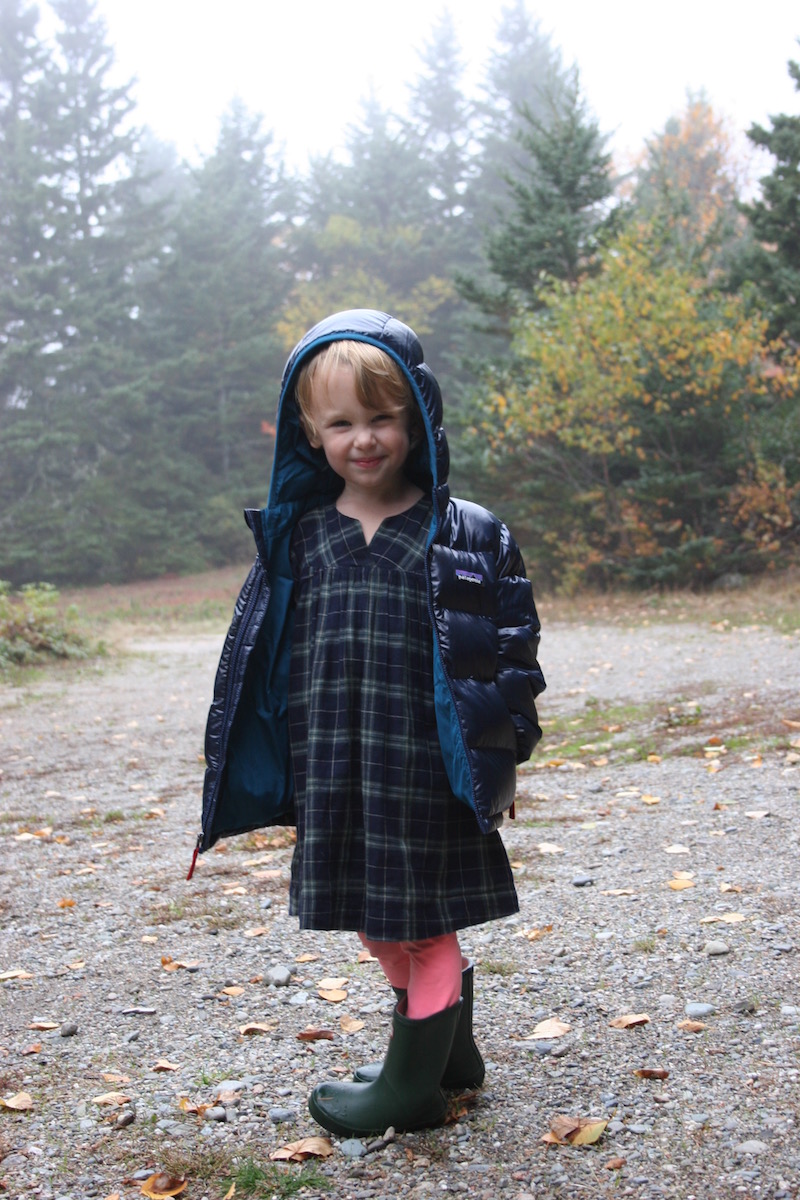 “I know why the Grinch doesn’t like Christmas. Because his Sister Grinch died. And SHE was the one who wrapped all the presents and bought the pumpkins. She was the one who put up the lights. He can’t do it because he’s at work all day and he’s TIRED. That’s why he doesn’t like Christmas.”
“I know why the Grinch doesn’t like Christmas. Because his Sister Grinch died. And SHE was the one who wrapped all the presents and bought the pumpkins. She was the one who put up the lights. He can’t do it because he’s at work all day and he’s TIRED. That’s why he doesn’t like Christmas.”-Joan, zeroing in on the near-Grinch lurking in all of us.
Things have felt mystifyingly terrible since that foolish and violent man was elected. It even feels hard to pray for, or hard to know where to begin with my prayers. The young soldiers who will soon be sent to more wars? The terminally sick who so-briefly had insurance that will be shoved off again? The companies that will move to other countries where skilled workers are accepted, regardless of their nationality? The police brutality that will unfold? Funny how things that feel very close and fragile can feel the hardest to pray for. Like it’s too risky for me to acknowledge how worried I am.
My friend suggested we start reading up on the resistance movement in world war II. (Here I always think of a favorite story of Norwegian citizens hopping on skiis and cleverly skiing in to disable a hydroelectric plant.) Joe’s family is Mennonite, a religious group that’s been quietly disagreeing with the government for years–deeply pacifist; attempting to redirect their taxes away from the military defense, devoted to issues of social justice and the marginalized. The idea of actively and consistently fighting with your government is not a new one. But it sounds mighty tiring. Though, I sort of fell in love with the idea of political PARTIES mentioned here.
Still, the hearth keepers must carry on, kneading the bread and chopping the kale, even as their ear tips towards the Diane Rehm Show playing in the background. Ruminate over ice skating lesson fees. Request a list of favorite Christmas books from the library. Remark upon the desperate need for plain candles in the house. Pull out coats and boots for the coat drives at church.
We didn’t guide the girls into beliefs of Santa as a gift-giver, but Joan is a big fan of his nonetheless, in the general good-citizen category. So I’ll map out a few places to take her to see him. (What if you could visit a favorite dignitary, and talk with them on a nice armchair for awhile?)
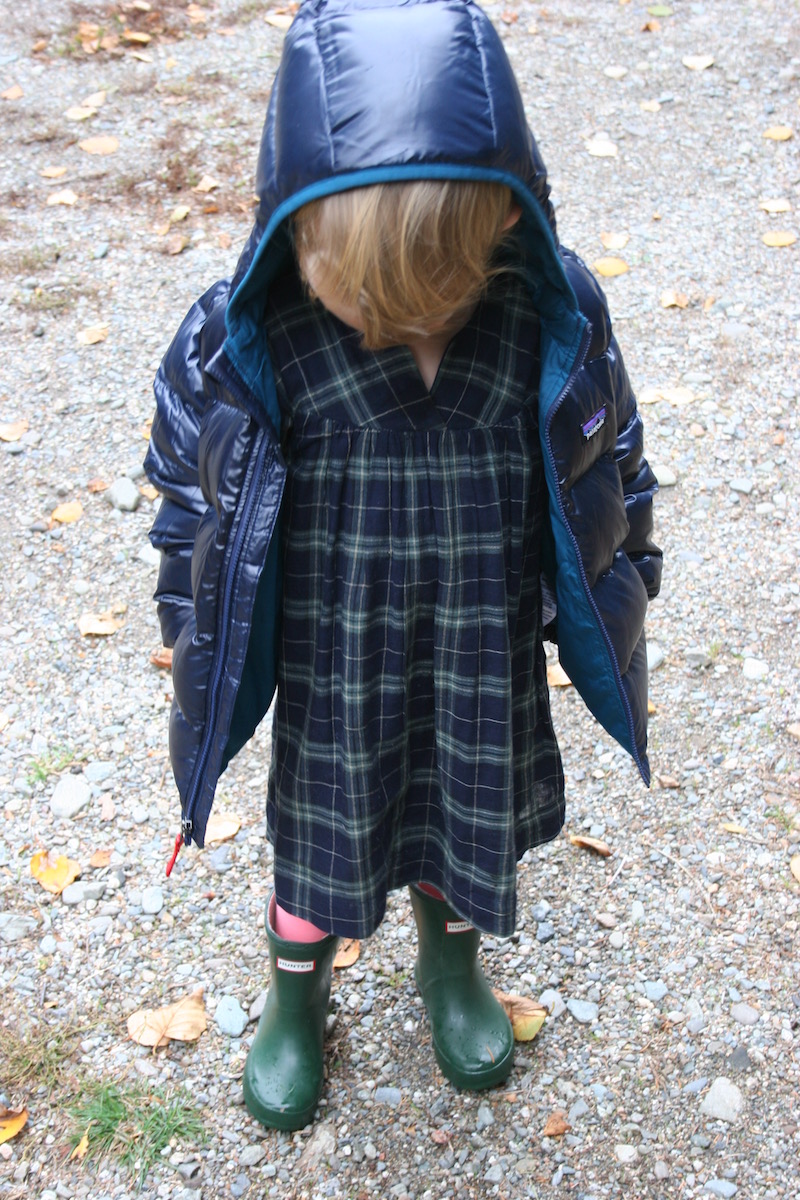
-
by the twentieth of August
note: I’ve simplified the comment form. it should be much easier to comment now–no need to log in. so sorry to you kind ones who’ve had troubles in the past.
In the morning one tiny ant bravely tugs a speck of bread off the table, in the afternoon there’s a carnival of them celebrating under the lavender planter, a feast of popcorn kernels and graham cracker sludge arranged around the edge like banners.
With three children about me now, the fun has accelerated. But so has everything else. Time is passing in a terrifying, groundless way. I have been given nothing but an accumulation of wonderful experiences and yet, I long for more. I long to exist inside of each day of the last five years at the same time.
Feeling cheated by the passing of time, I begin to feel cheated by everything. An experience not had. An afternoon that was not perfect. A recipe I haven’t made. A lake I’ve never swam in.
I am greedy for all of life’s pleasures; and it feels like I deserve them. I’m like a drunk bidding on eBay for the goods of carpe diem and all the auctions are ending tonight.
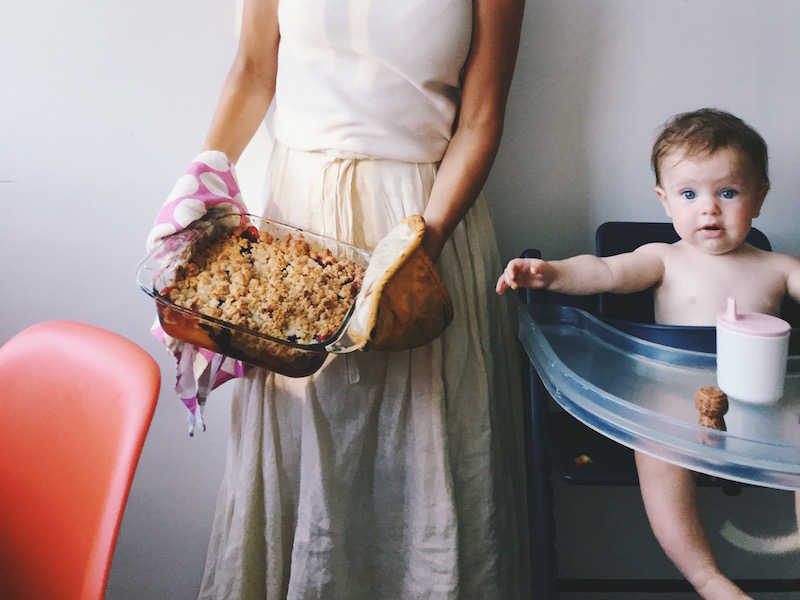
It’s the baby Alma that’s rubbed off on me. “Babies are born hedonists” says the Happiness Scientist. The day was meant for pleasure. Skin is meant to be grazed. If we sit next to each other, she worms her way closer to me until our arms are brushing. There can never be too much stretching and grabbing. Nor too much napping. Nor staring into stranger’s faces, but only if they are pleasant or, we might say—handsome. Nor too much chewing on golden ripe slices of mango, with the peel attached. She is so certain that everything placed within in her field of vision is for her that she grabs at each new thing with authority.
At night I try to organize files— I know I’m only going to stay awake for twenty minutes, why not do something purposeful and minute—and I click into a grainy near-dark video of my oldest playing peek-a-boo in Rome in front of the Pantheon. If the water was rippling in the right way, her face, at that age, would be a be a reflection of Alma’s. I feel that no time has past from then, and yet I finally got Lux to a dentist this week and she found cavities and examined me with a shocked expression that this was Lux’s first visit. From a certain tiny tooth’s perspective: five long years of decay!
Every year that has ever passed suddenly seems like too much. No more years, no more months, please. This must be women why become witches. Ever notice it’s always a woman who offers the chance to control time in those old fables? There was one I used to love—she gives out a glossy ball of string, it’s your lifetime wound up like a yo-yo. Tug it slightly and the moment will fly past, tug it more, and the year with a bad bully at school is over. No rewinding though, as our heroine soon learns.
I can’t seem to teach them enough, but then they mimic me and cry “look!” at every dropped leaf and I also wish they would be quiet. I want to read them books all day but I also wish they would stop banging the wall with their knees rhythmically while we do. They try. They forget. I wonder if I am as moody as they are; I think I might be.
We need no agenda, it seems just a shady tree would satisfy us all day. Then the next day, an agenda and lots to do. I rush them from pleasant spot to pleasant spot, feeling validated by the quick pace of our shoes on the sidewalk.
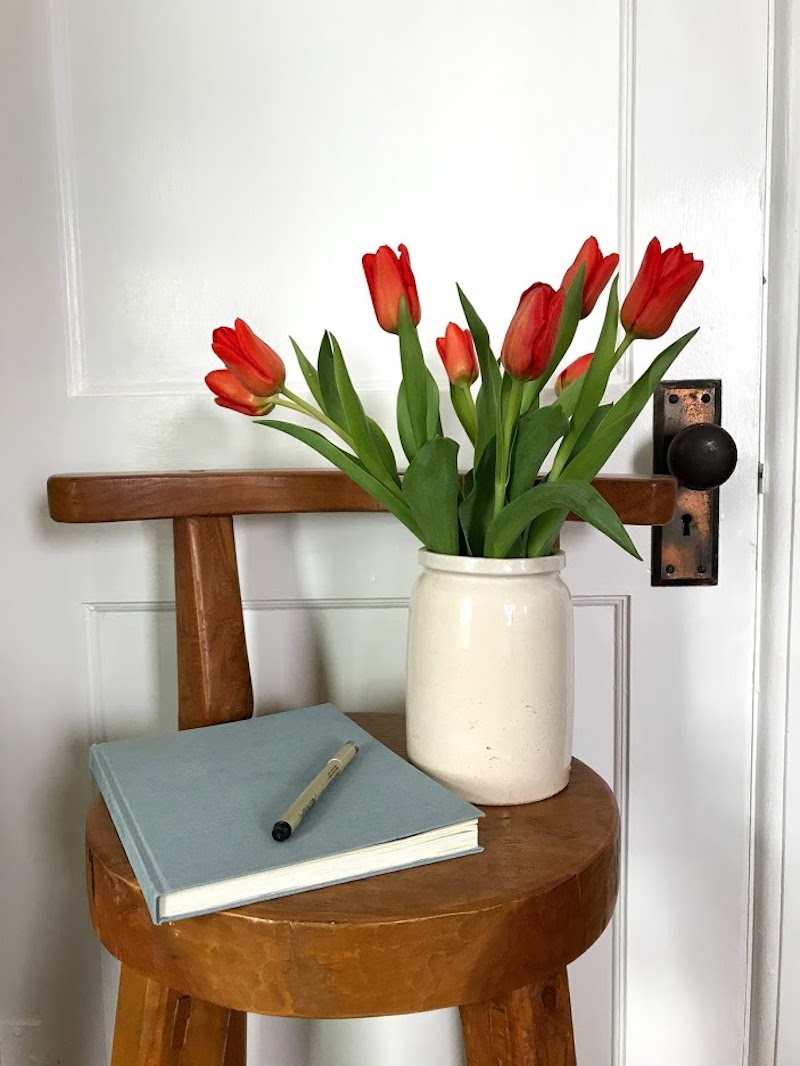 by
by